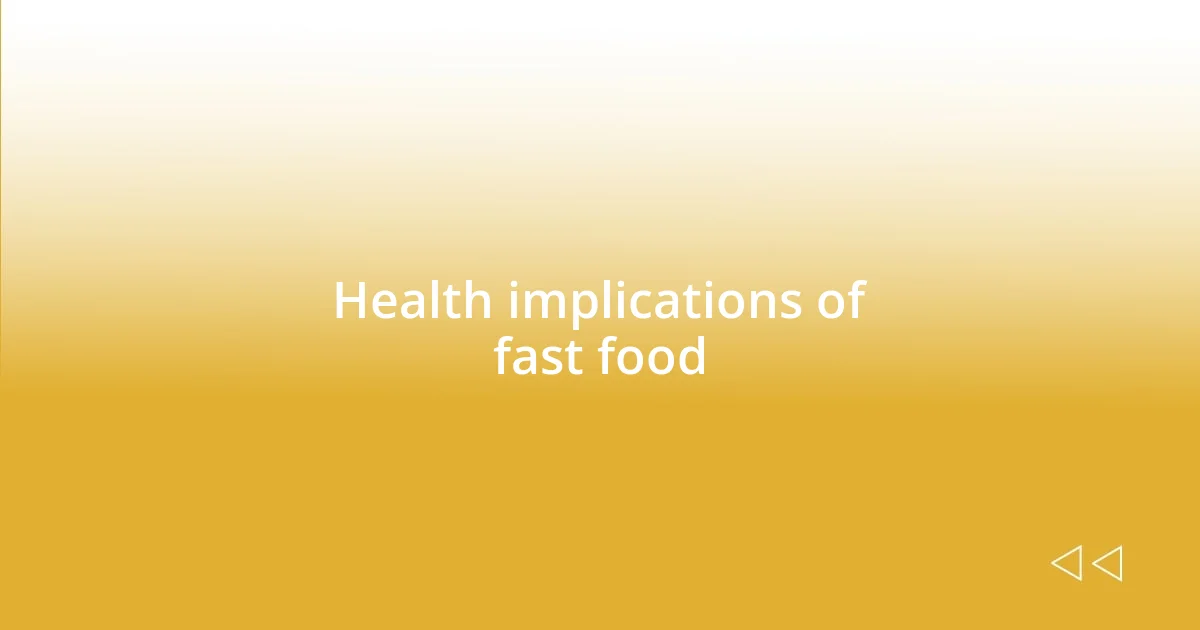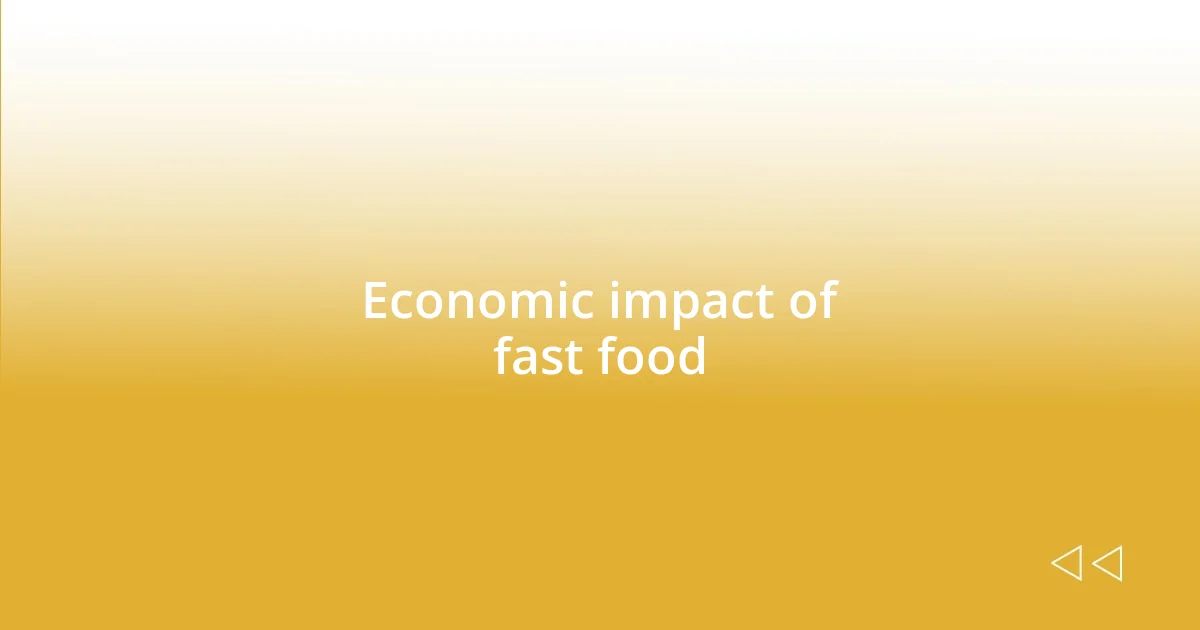Key takeaways:
- Fast food culture fosters social connections but often sacrifices health and quality for convenience, leading to complex trade-offs in our lives.
- The economic impact of fast food includes job creation and local business boosts, but also a potential decline in food diversity and local culture.
- Fast food affects both mental health and lifestyle choices, with the convenience reinforcing habits that can overshadow nourishing, meaningful meal experiences.

Understanding fast food culture
Fast food culture is more than just a convenient meal option; it embodies a lifestyle that reflects our society’s values and priorities. I remember sitting in my college dorm, late at night, with a group of friends after a long study session. The laughter and connection we shared over a dozen greasy burgers provided a sense of camaraderie that home-cooked meals simply didn’t replicate in that moment. Isn’t it fascinating how these quick bites can foster memories and connections?
When I think about fast food, I also reflect on how it has shaped our understanding of time and convenience. The other day, I found myself choosing a drive-thru over cooking dinner. I couldn’t help but wonder: are we sacrificing quality and health for a few extra minutes saved? This question often lingers in my mind, highlighting the complex trade-offs we navigate in fast food culture.
Moreover, the branding and marketing strategies of these food giants influence not only our eating habits but also our emotional connections. I once caught myself being drawn in by a nostalgic ad featuring a favorite childhood meal. It made me realize how fast food taps into our shared experiences, turning a simple burger into a comforting memory. Isn’t it intriguing how marketing can evoke such powerful sentiments?

Health implications of fast food
Fast food’s health implications extend far beyond the realm of convenience; they touch on our overall well-being. I recall a time when I indulged in fast food too frequently, telling myself it was a harmless treat. However, I soon felt sluggish and unmotivated, a stark contrast to the energetic lifestyle I aimed for. It dawned on me that the quick fix of a burger or fries often came with hidden costs to my health.
Consider the following health implications of fast food consumption:
- High calorie content: Fast foods are often calorie-dense, which can lead to weight gain if consumed frequently.
- Poor nutritional quality: These meals tend to be low in essential nutrients like vitamins and minerals while high in unhealthy fats and sugars.
- Increased risk of chronic diseases: Regular consumption has been linked to conditions such as obesity, diabetes, and heart disease.
- Impact on mental health: Diets high in processed foods may contribute to mood swings and anxiety.
- Digestive issues: The lack of fiber in fast food can lead to digestive problems, which I’ve certainly experienced after a weekend of unhealthy eating.
Shifting to a healthier food routine has transformed my energy levels, and I now better appreciate meals that nourish rather than just satisfy a hunger pang.

Economic impact of fast food
The economic impact of fast food extends beyond just the prices we see on menus. I vividly remember my first job at a local fast-food restaurant; it was eye-opening to see how many people relied on these establishments for employment. Fast food chains not only provide jobs to millions but often serve as a crucial source of income in areas where opportunities are limited. Isn’t it surprising to think that a simple burger joint can be a lifeline for so many families?
Additionally, the fast food industry significantly contributes to local and national economies. For instance, every time a new location opens, it can boost nearby businesses as customers flock to the area. This ripple effect can elevate local economies while generating tax revenue that supports community services. Personally, I’ve noticed that in my hometown, a new fast food chain sparked increased foot traffic in the surrounding shops and created a lively atmosphere. Have you ever seen something similar in your community?
However, one has to consider the downsides as well. The prevalence of fast food can sometimes overshadow local eateries, impacting food diversity and culture. I recall feeling a pang of nostalgia when a beloved local diner closed, only for a fast food outlet to replace it. This shift often brings up the question: at what cost do we prioritize convenience over preserving local culture? It’s a complex web of economic influence that leaves us with much to ponder.
| Economic Impact | Examples |
|---|---|
| Employment Opportunities | Millions employed globally with many first-time workers |
| Local Business Boost | Fast food outlets increase traffic to surrounding businesses |
| Tax Revenue Generation | Fast food establishments contribute to local and national taxes |
| Food Culture Shift | Local eateries face challenges from fast food prevalence |

Psychological effects of fast food
It’s fascinating to consider how fast food impacts our minds as much as our bodies. I’ve found that indulging in fast food often leads to fleeting moments of pleasure, followed by a sense of guilt. It’s like a rollercoaster of emotions; that initial rush from eating something greasy is quickly replaced by feelings of remorse. Have you ever felt that way after a late-night drive-thru run?
Moreover, fast food can influence our mental state over time, creating a cycle that’s hard to break. For instance, I noticed how my mood dipped after regular takeout nights became the norm. I read somewhere that diets high in processed foods are linked to anxiety and depression, which resonated deeply with me. It made me wonder: Could the convenience of fast food be coming at a profound emotional cost that we often overlook?
Finally, the speed of fast food aligns with our fast-paced lives, reinforcing a mindset where instant gratification reigns. I remember a friend who’d often joke about needing a “food fix” to power through her day. This relationship with food can blur the lines between hunger and habit, leading us to seek quick solutions rather than mindful choices. Have you considered how often you reach for fast food out of convenience rather than true hunger?

Fast food and lifestyle choices
Fast food is intricately woven into our daily routines, shaping our lifestyle choices in ways that can be quite subtle. There was a time when I found myself gravitating toward drive-thrus during hectic weeks. It made sense; after a long day, the idea of cooking was daunting. But what I didn’t realize then was how often these quick meals began replacing not just my dinner plans, but family gatherings too. Have you ever noticed how the convenience of fast food can pull you away from home-cooked meals and cherished moments?
The impact on my health was equally evident. I clearly recall a period where my energy levels dipped dramatically after too many fast food dinners. It hit me one afternoon when I felt sluggish halfway through a run; my body was crying out for real nourishment. When I switched to preparing healthier meals, I felt a wave of energy and focus that fast food simply couldn’t offer. It’s fascinating to consider how our food choices resonate in our physical and mental well-being, isn’t it?
Engaging with fast food also means engaging with a specific lifestyle narrative—one that often prioritizes speed over quality. I’ve reflected on how colleagues would bond over lunch breaks spent at burger joints, sharing laughs and stories, yet I often left feeling unfulfilled, craving something more. It made me question how much of our social interactions revolve around quick bites rather than meaningful connections over a thoughtfully prepared meal. What do you think—is fast food filling our stomachs but leaving our hearts somewhat empty?












